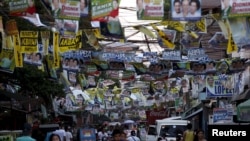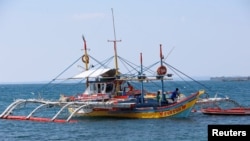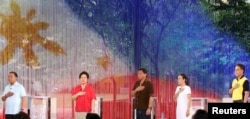With the race for Philippine president shaping up to be one big popularity contest between the four main contenders, the economic gains, security alliances and foreign policy of the current administration hang in the balance.
In national surveys of the past two weeks, controversial Davao City Mayor Rodrigo Duterte has pulled into a double-digit lead over his rivals who had all been one to five percentage points apart throughout the three-month campaign period leading up to the May 9 elections.
On a recent Tuesday night inside an airless, packed Manila-area school gym, Duterte, the foul-mouthed 71 year old, took the stage and launched into a rambling speech. He railed against corruption and elicited wild applause whenever he swore.
Duterte, a self-professed killer of criminals, has run on the promise of getting rid of criminals within his first six months in office. And he has garnered much of his support from voters who want to see the return of the death penalty.
His popularity did not wane after he called the pope a "son of a bitch," nor after his remarks about wishing he had been first in line in the gang rape of an Australian missionary killed during a Davao City jail riot in 1989.
The remarks drew criticism from both the Australian and U.S. ambassadors to the Philippines.
On the campaign trail, Duterte fired back that both diplomats should "shut up" and keep out of Philippine elections, lest they show bias.
US relations
A week before the controversy, reporters asked how he saw relations with the U.S.
"We are allied with the West, see? So we allowed the military forces of the U.S. here in this country. So it would give you an idea, where we go, down the road," he said.
The two countries have started to implement an agreement that would see more U.S. troop visits and their use of local bases as staging points.
Leftist groups have said this signaled the return of U.S. bases in the country after a groundswell of nationalistic fervor forced their closure in 1991. The agreement does not include permanent U.S. bases.
This time around, the public has expressed a stronger preference to have the Americans around, especially in the face of an ever more assertive China, which claims practically the entire South China Sea.
South China Sea claims
Earlier in the campaign, Duterte said he would seek U.S. help in dealing with China over Philippine claims in the disputed sea, locally called the West Philippine Sea.
But more recently he vowed to ride a jet ski to one of the contested outcroppings, Scarborough Shoal, plant a Philippine flag there and expect to die a hero at the hands of the Chinese.
His closest rival, Senator Grace Poe, who has traded the number one and two spots with him throughout the campaign period, takes a more pragmatic approach to the sovereignty dispute with China.
"It's true, we have a fight in the West Philippine Sea," said Poe in a Manila-area speech. "True, we've got problems with crime and drugs. So what would I do as president? I'll be honest, I'm not going to shoot the gun myself. But I will make sure that the police who go to all these places will be sensible."
Poe, a U.S.-educated junior senator, wants more support for the Philippine Coast Guard to better patrol the country's territorial waters and help safeguard Philippine fishermen who have been all but kept out of Scarborough by the Chinese.
Furthermore, Poe's foreign policy advisor, Tony LaViña, said the senator, whose movie star father ran for president in 2004 but lost by a close margin, sees a need to have the U.S. around as a deterrent to China.
"Keep that close relationship, but at the same time be able to keep our options open with respect to the country itself. Being able to engage with China, with our neighbors on a strategy that's based really on our national interest, not the interests of the U.S. or any other country."
Candidates court lower class voters
Poe has amassed solid support among the lower classes who admired her father, the late action-star Fernando Poe Jr. Some told VOA that she showed the same concern for them that he had during his run for president.
Alfonzo Artates, Jr., an out of work janitor was at a Labor Day rally to which Poe was invited. He said he likes the 47 year old.
"The way we see it, she is a great supporter of the poor. She supports all the needs of the poor. She loves them and has claimed them. So if she becomes president, perhaps there will be fewer poor people and there won't be any thieves in society."
Under the current administration of President Benigno Aquino, the economy has posted steady growth above six percent over the past six years, earning the country investment grade status for the first time. But some of the candidates have argued the poor have not felt the benefits.
Seventy-three-year-old Vice President Jejomar Binay, who is running on the platform of helping the poor, has promised a new day for this segment of the population. In a speech in Metro Manila, the 20-year mayor of Makati, the country's highest tax revenue-generating city, ticked off a list of qualities that he said voters could expect from him.
"A leader that respects the dignity of women. A leader that sets a good example for children. A leader that helps and serves the poor. And I will not brag about killing my fellow man."
Farther from home, Binay has said he would lead the Philippines to closer ties with China, proposing a joint project in the disputed outcroppings in the resource rich South China Sea, while also affirming Manila's territorial claims. His vice presidential running mate, Senator Gregorio Honasan told foreign correspondents last month that a Binay administration would entertain the possibility of permanent U.S. bases.
The candidate most expected to stay the course on foreign policy is Manuel Roxas, former interior secretary of the current administration of President Benigno Aquino.
Roxas, 58 and a former U.S. investment banker with 20 years in Philippine public service, led the country's emergency response after super typhoon Haiyan struck the central part of the country and killed more than 6,300 in 2013.
"I've given my all in everything that I've done. And we've attained quite a bit. We've come so far. We've accomplished many things. And in that respect I put my record up against all the others."
A spokesman said as president, Roxas would continue with the "basic policy of the Aquino administration" of maintaining independence while honoring alliance commitments with Washington.








